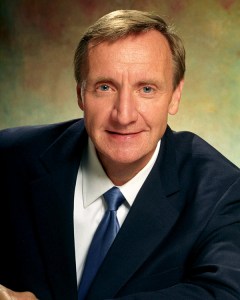[I am working on a project that may become a book on the most influential evangelicals leaders of our generation, since 1976, and the impact they’ve had on the church and their times. I will introduce them briefly on this blog from time to time. Who should be on this list?]
37. Richard Cizik. Renegade b.1951

After nearly five years of tweaking conservative evangelical leadership on a variety of issues, but most pointedly global warming, from his post as the vice president and chief Washington lobbyist for the National Association of Evangelicals, Richard Cizik finally accomplished what his persistent Christian adversaries could not. He self-destructed on a national radio program, stepping beyond NAE dogma not on an environmental issue, but on same-sex unions. After a run as one of the most-quoted evangelicals, occasionally taken to the woodshed by his NAE bosses but frequently glorified in mainstream media, Rich Cizik was fired by the association and found himself in the evangelical wilderness, with invitations and job offers only from his secular admirers and the most progressive evangelical allies.
Cizik has been an honest and valuable voice for evangelicals for nearly 30 years, twisting the arms of politicians on issues important to the movement, such as abortion, pornography, religious freedom, AIDS, and—more recently— human trafficking, global poverty, climate change, and torture. The issues that gripped him broadened over the years, and while he remained theologically conservative and pro-life, the matters that began to stir his passions shifted from the historic issues of the culture wars to the causes usually championed by the evangelical left and progressives generally.
Cizik is described as one of the “new breed of evangelicals,” a label made popular by the New York Times[1] to give sashay to evangelicals who began to add their voices to those of progressives on topics such as the environment. He was on the point for this new part of the movement, but he outran his cover and left himself vulnerable to his adversarial brethren. Although evangelicals have been embracing many new missions, they aren’t moving as fast as Cizik or as far to the left.
I’ve seen all of this happening while working at Rich’s side in the evangelical environmental movement, and as our public relations firm, Rooftop, represented him and the NAE government affairs office in the final years of his tenure. I have found Rich to be devout, earnest, ambitious, and slightly reckless.
Cizik can easily be seen as one strand of a thread extending from the generation’s beginnings, in the tradition of Francis Schaeffer and Carl Henry–evangelicals who were strictly orthodox, but advocated a broad engagement with the world. “I’m not some upstart who’s trying to conjure up a new vision,” Cizik said. “This goes back a long way.”[2] His errors are tactical rather than theological.
More than anything, Cizik has been driven by this moral necessity for Christians to fight climate change.
He thought little about climate change until 2002, when he attended a conference on the subject and heard a leading British climate scientist, Sir John Houghton, a prominent evangelical. “Sir John made clear that you could believe in the science and remain a faithful biblical Christian. All I can say is that my heart was changed. For years I’d thought, ‘Well, one side says this, the other side says that. There’s no reason to get involved.’ But the science has become too compelling. I could no longer sit on the sidelines. I didn’t want to be like the evangelicals who avoided getting involved during the civil rights movement and in the process discredited the gospel and themselves.
“As a biblical Christian,” Cizik said, “I agree with St. Francis that every square inch on Earth belongs to Christ. If we don’t pay attention to global climate change, it’s pretty obvious that tens and or even hundreds of millions of people are going to die. If you have a major sea-level rise, then Bangladesh becomes uninhabitable. Where do you put its 100 million people? Do you put them in India? In China? They’d have no place to go.”[3]
In 2006, Cizik was part of a group that organized the Evangelical Climate Initiative[4], a major statement from 86 key evangelical leaders that described climate change as an urgent moral issue for Christians and called for the government to act on it. Cizik was part of the group of four people who planned ECI and made waves with its launch. (I was part of that group and served as campaign director for two years.) The real mastermind of the initiative, though, was Jim Ball, who for the last 15 years has been the progressive, intellectual glue for environmental work among evangelicals (now climate director for the Evangelical Environmental Network). It is Ball who mentored Cizik and taught him most of what he knows about both the science and the biblical basis for climate work. Ball, however, is a far more cautious operator, and while cheering Cizik’s progress on environmental issues, constantly counseled him to be more careful about his public statements on climate change as an NAE spokesman.
That counsel, as well as similar advice he received from Rooftop and others, went unheeded.
It is a shame that Cizik is currently too toxic to have influence among mainstream evangelicals, for his instincts and convictions are important among a profusion of concerns. That may change as he continues to work within his new organization: The New Evangelical Partnership for the Common Good, and as the disagreements on some issues begin to lose their edge. Also, while some of Cizik’s most virulent critics are in the final years of active ministry, he is a relatively youthful 58.
[1] http://www.nytimes.com/2007/03/03/us/03evangelical.html
[2] Newsweek. January 28, 2010 http://www.newsweek.com/id/232669
[3] http://www.grist.org/article/2010-04-27-jesus-climate-change-journey-of-evangelical-leader-rich-cizik/
[4] http://christiansandclimate.org/



